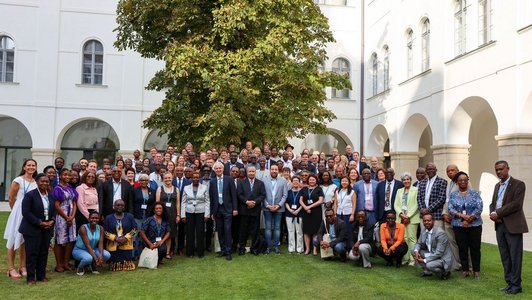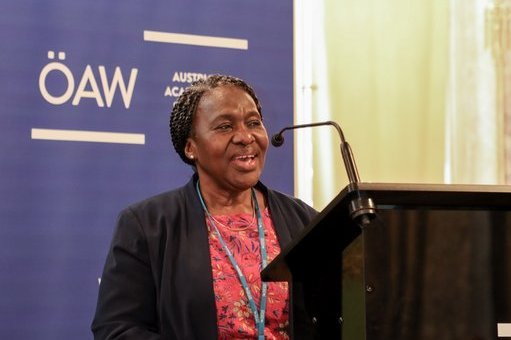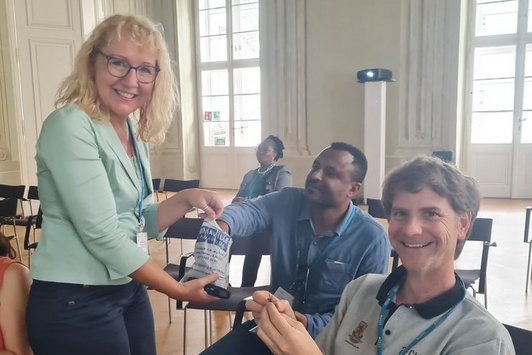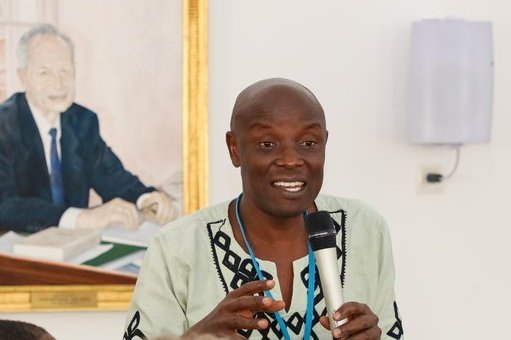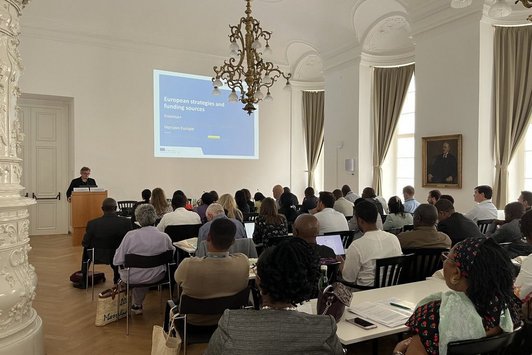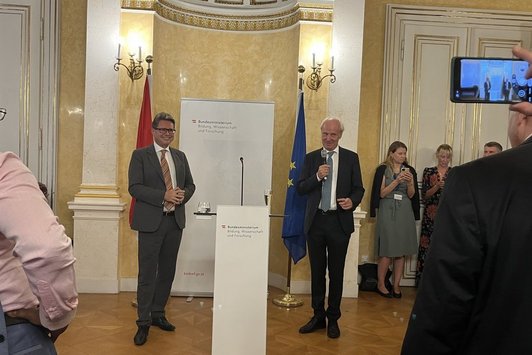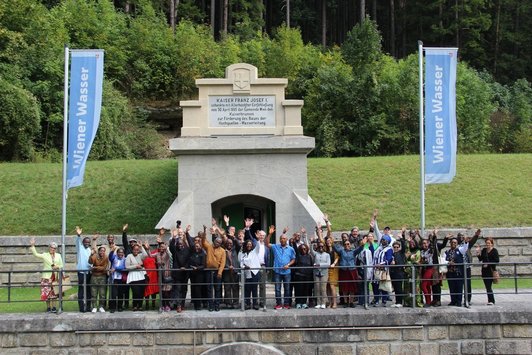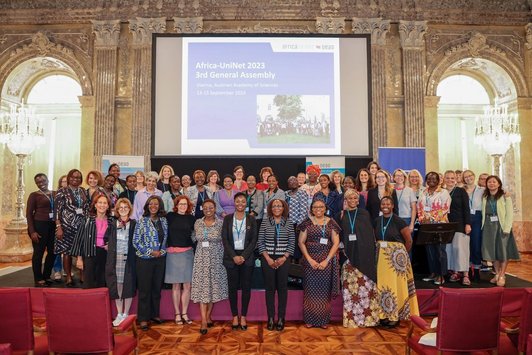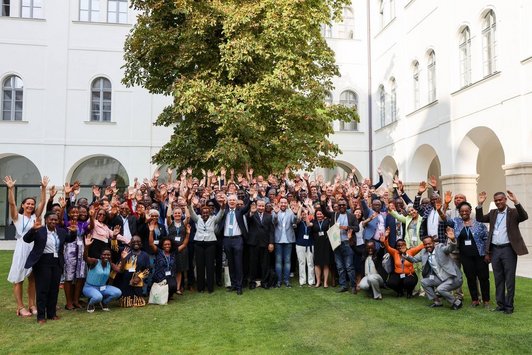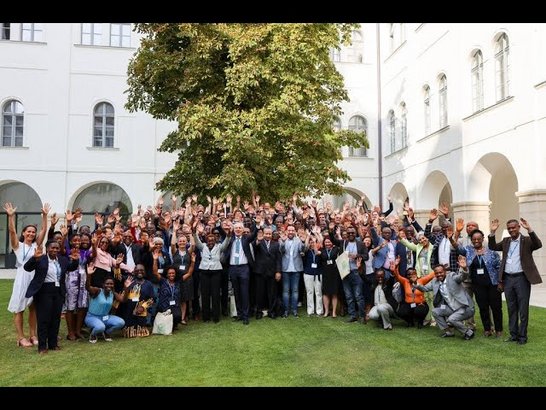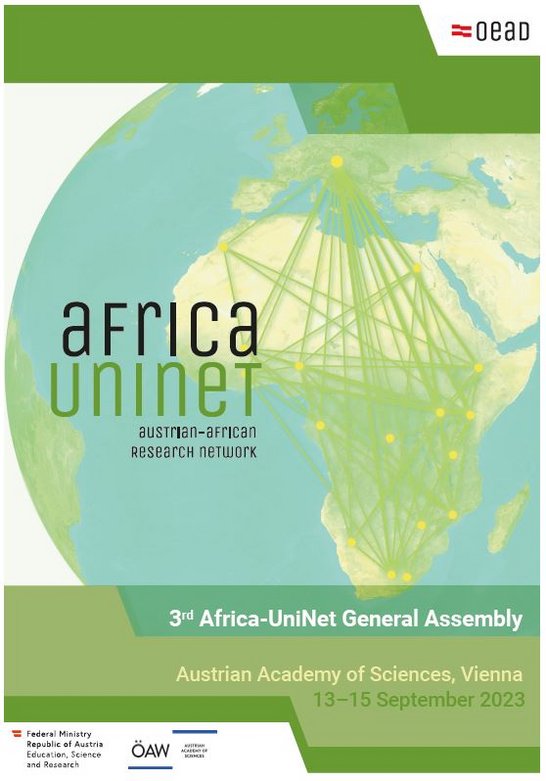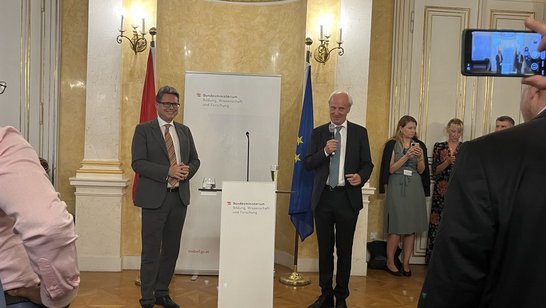3rd General Assembly 2023
More than 140 representatives from 18 countries and 70 universities and research institutions gathered as part of the 3rd Africa-UniNet General Assembly from 13-15 September 2023 at the Austrian Academy of Sciences (OeAW) in Austria. It was the second gathering of the network in Vienna, after it was initiated in 2019 by the Federal Ministry of Education, Science, and Research (BMBWF), the OeAD as Austria's Agency for Education and Internationalization, and the University of Natural Resources and Life Sciences (BOKU).
Never before have so many representatives of African research institutions met with Austrian scientists to showcase their collaborative projects and deepen scientific partnerships between Austria and African countries.
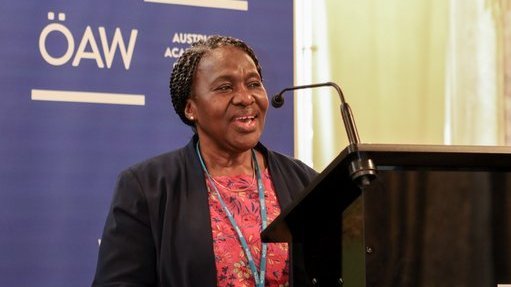
Keynote Addresses
One of the main themes of the conference was addressed in the opening Keynote Addresses by Joel Onyango from the African Center for Technology Studies in Kenya and Gabriele Slezak from University of Vienna/ÖFSE on Decolonizing Knowledge Systems in Scientific Cooperation. Drawing upon examples from academic partnerships, they illustrated the transformative potential of self-awareness and reflexivity in challenging biases, fostering inclusivity, and promoting a more equitable approach to cooperation. Taking a different perspective on this topic in his Keynote Address, Africa-UniNet Board member Belachew Gebrewold (MCI Innsbruck) focused on the “decolonization of the African mind”. He argued that African research and science have to promote the transformation of African society socially, politically, economically, and technologically. The keynotes promoted a lively and controversial debate moderated by Stella Asiimwe from Weltmuseum Wien.
- J. Onyango & G. Slezak: Decolonizing Knowledge Systems in Scientific International Cooperation
- B. Gebrewold: Decolonizing the African Postcolonial Mind
In her Keynote Address on the second day, Peggy Oti-Boateng, Executive Director of the African Academy of Sciences, argued that the scientific landscape on the African continent has greatly advanced in the last few decades. There has been an increase in institutions conducting a diverse array of much-needed scientific research. This, coupled with increased talent and growth in African scientific expertise, has resulted in a very good local innovations landscape for the continent and advanced development. The African Academy of Sciences (AAS) since 1985 with its partners have been central to this growth, transforming lives in Africa through Science, Technology, and Innovation (STI). However, she emphasized that there is a need for more commitments and investments not just to sustain the gains made but also to help bring Africa closer to the rest of the world in terms of capacities for research and innovation.
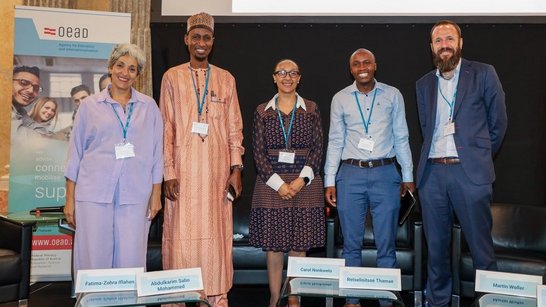
Panel Discussion: The Interconnection between the Academic World and Social Reality
The panel discussion aimed to reflect on the interconnection between the academic world and the social reality in African countries. By discussing the introductory question “Is academia an extension of privilege?” posed by the moderator Stella Asiimwe (Weltmuseum Wien), the panelists Fatima‐Zohra Iflahen (Full Professor and Vice‐President in charge of Research, Cooperation & Partnerships at Cadi Ayyad University, Morocco), Abdulkarim Sabo Mohammed (PhD holder in finance and lecturer at the Department of Banking and Finance at the Federal University Dutse, Nigeria), Carol Nonkwelo (Senior Director for Research, Innovation and Postgraduate Education at the University of Pretoria, South Africa), Retselisitsoe Thamae (Senior Lecturer in Economics and member of the Energy Research Centre and the Innovations Committee at the National University of Lesotho) and Martin Woller (Regional Director Africa & Middle East at the ADVANTAGE AUSTRIA head office in Vienna, formerly Head of ADVANTAGE AUSTRIA Egypt and Libya , Deputy Head of ADVANTAGE AUSTRIA in Nigeria and China) brought a wide variety of perspectives to the stage and showed ways in which the social relevance of universities in African contexts can be increased. Read the report on the panel discussion.
Project Presentations
In the course of the meeting, 20 of the currently 61 Africa-UniNet projects were presented in four thematic sessions:
- Education, Art and Knowledge Production
- Agricultural Research and Food Security
- Water, Environmental Research and Conservation
- Public Health and Community Development
You can find the book of abstracts of the project presentations in the Programme booklet and further information in the Projects section of the website.
How to Keep the Elephant on the Path: Managing Project Expectations
Workshop by Meggy Kantert and Christian Anieke (Godfrey Okoye University)
Every project brings together people with different experiences and, above all, contrasting expectations. In addition, many expectations are implicit, i.e. unspoken, and disappointments in the project are inevitable. Using a concrete project example from Christian Anieke, participants in this workshop reflected on their own explicit and implicit project expectations, which are influenced by culture as well as expected results, and may change over time.
This interactive exercise was an eye-opener for many participants as it became clear that most expectations are not openly stated. With the "Keep the elephant on the path" model, workshop facilitator Meggy Kantert gave participants concrete guidance on how to better deal with these challenges in the future. The core of the model is to bring expectations and reality together and to proactively discuss and continuously adjust expectations in an open dialogue. Key to this is making expectations explicit and learn what you could do differently in the future to build up productive partnerships.
At the end of the workshop, the participants were given a small elephant to remind them in their daily lives of the importance of expectation management for the success of a project.
Expanding the Horizon: Funding Opportunities beyond Africa-UniNet
Workshop by Carol Nonkwelo (University of Pretoria) and Peter Mayr (Paris Lodron University of Salzburg)
Since the launch of Africa-UniNet 2020, 61 projects have been accepted for funding. This session, presented by Carol Nonkwelo and Peter Mayr, provided information on funding opportunities for higher education and research beyond Africa-UniNet. Erasmus+ and its increased funding budget for Sub-Saharan-Africa until 2027, as well as the Joint African Union – European Union Agenda were highlighted in detail. Peter Mayr also presented Austria’s national funding programmes: from the Ernst Mach scholarship to the APPEAR programme, several options and current open calls were mentioned.
The websites www.grants.at and www.ffg.at/en provide information on upcoming/current funding opportunities. Suggested by one of the participants, the University of Cape Town sends out its funding bulletin every month. For Africa-UniNet it was suggested to send out funding opportunities that exist beyond the network and to exchange information on funding schemes among its members.
Africa-UniNet General Assembly
During the actual General Assembly, which was attended by official Representatives of Africa-UniNet member institutions, two new member institutions were introduced and welcomed to the network. An overview of the Africa-UniNet Member institutions is provided on our website. During the General Assembly it was decided that in the future the General Assembly will meet in person every second year. In the year between the meetings, a “summer” school (1-2 weeks) in Africa, with participation of institutions from countries in Africa and Austria, could be organized. The local member institutions organize the meeting with financial support of Africa-UniNet.
